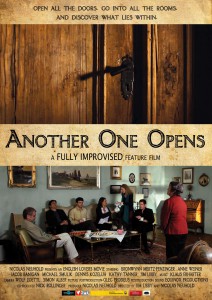Improvisation is used a lot in making films and tv shows. What role does it play in cinema or television? And what to expect from the new film Another One Opens, which is completely improvised?

I spent December playing 27 sold out shows with The English Lover’s impro group in Vienna. This is a group of eight individuals, each coming from a different English speaking nation, each creating a formidable acting career in Austria, each with a different perspective on improvisation. A recent product from The English Lovers is an improvised full length feature film called Another One Opens. The film, shot over 12 days in a castle in the Austrian countryside (and then edited for two years) was entirely improvised: the ancient castle inspired the story, dialogue and characters. The cast would shoot that day’s scenes, dine together and pick the location and players for the next day’s scenes. The result is quite phenomenal. A very high production value film that is inspiring to watch. It brings out the question: what is the role of improvisation: a medium that is based on process, in cinema or television: a medium based on a finished product?
First rule of TV or film: it needs to look perfect.
First rule of improvisation: “mistakes” create the original moment.
There’s lots of improvisation being used to create product. Whether it’s the occasional ad libbing a scripted line which the director keeps, to a firm story structure of which the dialogue is improvised like Curb Your Enthusiasm and Outnumbered, to short form shows like Whose Line is it Anyway, GreenScreen, Thank God You’re Here, and the various adaptations of the popular French series Vendredi Tout est Permi (Alles Mag op Vrijdag on RTL4). Improvisation is influencing more than ever, a medium that is traditionally heavy on structure and planning.
Having attempted this myself in a pilot show called The Wonderful World of Ad Fernhout, I researched the subject extensively. On Curb, the story is actually written ahead of time but not all the actors know what they are supposed to say. The dialogue is improvised on set with some facts being told in advance to the actors. The director might tell them where they are coming from, what they feel about the other character, something they might want to mention and let them try a few takes giving notes between takes. The results can sometimes surprise. The dialogue usually feels more natural (while sitcom dialogue goes from punchline to punchline, improvised dialogue tends to be more undulating).
In short form shows, editors tend to select the best games and continuously show the audience to prove to the home audience that this is being created out of thin air. These shows often have “writers” whose job it is to create the best setups for the games. In the spirit of the show, this is sometimes not shared with the actors but often helps them set up a situation that is funny from the go moment. Another One Opens is a whole new genre within this genre. Sometimes funny, moving, emotional and serious, it uses the improvisation to create a more emotionally diverse result.
And this just in: All Improv will be sponsoring Jim Libby, director and star of Another One Opens to introduce his movie in Amsterdam on April 26th! The event will combine media and improvisation professional to understand how they can cooperate more. Save the date, it’s going to be…. unpredictable.
Another One Opens premiers in Amsterdam at Boom Chicago, April 26th at 13:00
After the film a Q&A with Jim Libby and members of the panel about the role of impro in film and television.